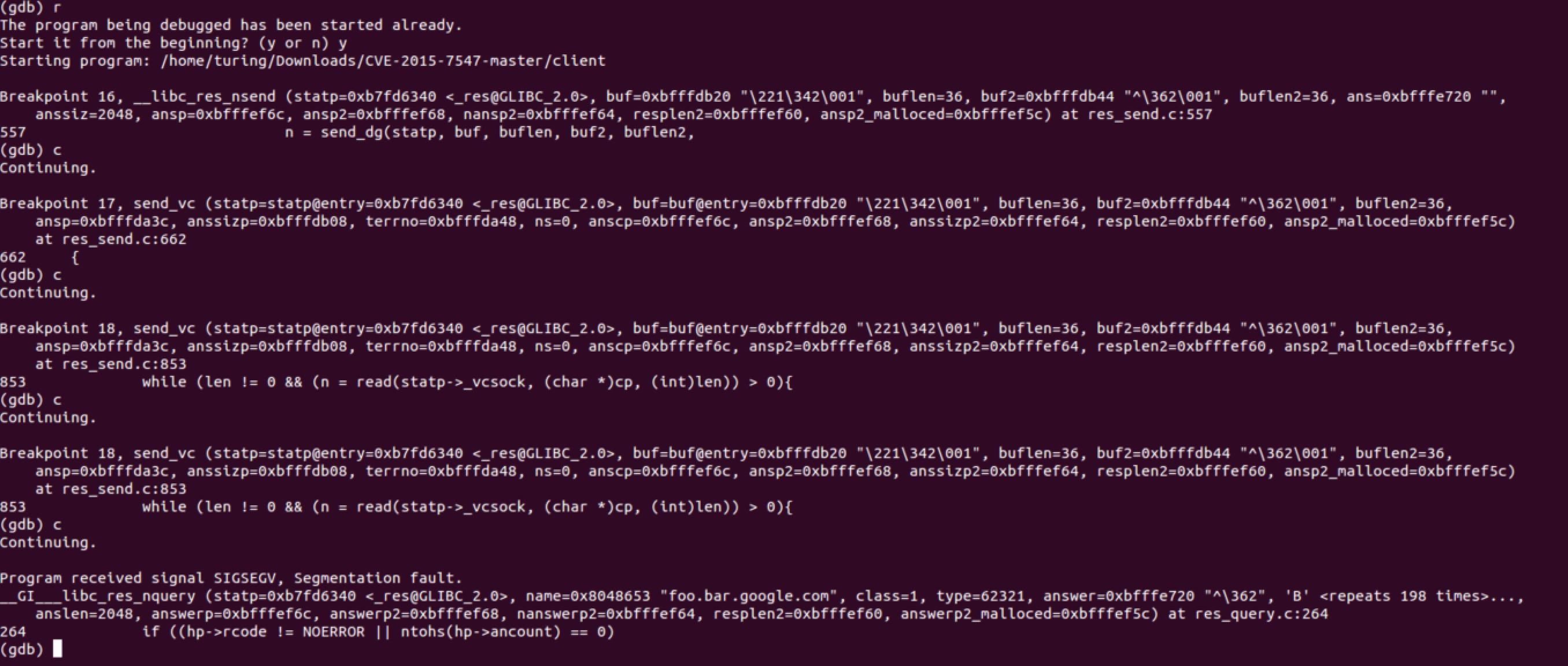0x00 漏洞信息
最近glibc有一个栈溢出的漏洞具体情况,漏洞的具体信息可以参考下面链接。
CVE-2015-7547: glibc getaddrinfo stack-based buffer overflow
poc在github上:https://github.com/fjserna/CVE-2015-7547
0x01 环境准备
操作系统:ubuntu15.04
glibc版本:glibc-2.2.0
1.1 glibc源码编译
在ubuntu系统下,只需要执行源码和调试符的命令之后就可以使用gdb对glibc的跟踪调试,安装指令如下:
sudo apt-get install libc6-dbg
sudo apt-get source libc6-dev
但是因为系统自带的glibc是发行版的,所以在编译的是时候选用了优化参数-O2,所以在调试的过程中会出现变量被优化无法读取以及代码运行的时候与源码的行数对不上的情况。
所以需要自己编译一个可调式并且没有过度优化的glibc来进行调试。
首先,从glibc的官网下载glibc的源码。我选择了2.20的版本。编译安装glibc的方法很容易可以在网上找到。需要注意的是在进行configure时需要设置一些特殊的参数。如果需要调试宏可以添加 -gdwarf-2,glibc无法使用-O0编译,不过-O1也够用了。
/opt/glibc220/configure --prefix=/usr/local/glibc220/ --enable-debug CFLAGS="-g -O1" CPPFLAGS = "-g -O1"
在configure执行完成之后只需要简单执行编译与安装就好了。
sudo make
sudo make install
1.2 使用调试版本glibc编译POC
在glibc编译安装成功后,系统默认的glibc还是原来的那个。所以需要选择指定的glibc来编译POC代码。
gcc -o client CVE-2015-7547-client.c -Wl,-rpath /usr/local/glibc220
通过ldd指令可以看到,确实使用了刚编的glibc。
这个时候就可以用GDB调试glibc中的函数了。
1.3 配置本地dns服务器
运行poc的python服务器。修改/etc/resolv.conf。将域名服务器改为127.0.0.1就好了。不过这样一来这台机器访问网络就会出问题了。
nameserver 127.0.0.1
0x02 漏洞分析
2.1 运行POC
使用gdb启动客户端直接运行,出现崩溃堆栈。

2.2 寻找溢出函数
可以看到栈都被覆盖为0x42424242,根据google提供的分析,出问题的是send_dg和send_vc函数。分别在send_vc和send_dg上下断点,重新运行程序,会发现先调用send_dg函数再调用send_vc函数。

可以看出是在send_vc的时候发生了栈溢出。
因为根据google提供的分析可以知道是在读取socket的时候发生的溢出,可以通过结合源码调试来分析。剔除不需要看的代码,核心代码如下,总共干了四件事。
[1]选择适当的缓存
[2]读取dns包的长度
[3]读取dsn包
[4]判断是否需要读取第二个数据包。
static int
send_vc(res_state statp,
const u_char *buf, int buflen, const u_char *buf2, int buflen2,
u_char **ansp, int *anssizp,
int *terrno, int ns, u_char **anscp, u_char **ansp2, int *anssizp2,
int *resplen2, int *ansp2_malloced)
{
const HEADER *hp = (HEADER *) buf;
const HEADER *hp2 = (HEADER *) buf2;
u_char *ans = *ansp;
int orig_anssizp = *anssizp;
[...] //这段干的事情可以无视。
read_len:
//----------------[2]-------------start----------------
cp = (u_char *)&rlen16;
len = sizeof(rlen16);
while ((n = TEMP_FAILURE_RETRY (read(statp->_vcsock, cp,
(int)len))) > 0) {
cp += n;
if ((len -= n) <= 0)
break;
}
if (n <= 0) {
[...] //出错处理无视。
}
int rlen = ntohs (rlen16);
//----------------[2]-------------end----------------
//----------------[1]-------------start----------------
int *thisanssizp;
u_char **thisansp;
int *thisresplenp;
if ((recvresp1 | recvresp2) == 0 || buf2 == NULL) { //第一次从read_len开始读取网络包进入这个分支。
thisanssizp = anssizp; //第一次调用read时可用内存65536
thisansp = anscp ?: ansp; //第一次调用read时使用的缓存anscp
assert (anscp != NULL || ansp2 == NULL);
thisresplenp = &resplen;
} else {
if (*anssizp != MAXPACKET) {
[...] //重现流程中不会进入这块。
} else {
/* The first reply did not fit into the
user-provided buffer. Maybe the second
answer will. */
*anssizp2 = orig_anssizp; //第二次调用时可用内存长度65536
*ansp2 = *ansp; //第二次调用read时使用的缓存ansp
}
thisanssizp = anssizp2;
thisansp = ansp2;
thisresplenp = resplen2;
}
//----------------[1]-------------end----------------
anhp = (HEADER *) *thisansp;
*thisresplenp = rlen;
if (rlen > *thisanssizp) {
[...] //重现流程中不会进入这块。
} else
len = rlen;
if (__glibc_unlikely (len < HFIXEDSZ)) {
[...] //重现流程中不会进入这块。
}
cp = *thisansp; //*ansp;
//---------------[2]--------------------start-----------------
while (len != 0 && (n = read(statp->_vcsock, (char *)cp, (int)len)) > 0){ //溢出点。
cp += n;
len -= n;
}
//---------------[2]--------------------start-----------------
if (__glibc_unlikely (n <= 0)) {
[...] //重现流程中不会进入这块。
}
if (__glibc_unlikely (truncating)) {
[...] //重现流程中不会进入这块。
}
/*
* If the calling application has bailed out of
* a previous call and failed to arrange to have
* the circuit closed or the server has got
* itself confused, then drop the packet and
* wait for the correct one.
*/
//---------------[4]--------------------start-----------------
if ((recvresp1 || hp->id != anhp->id) //不进。
&& (recvresp2 || hp2->id != anhp->id)) {
[...] //重现流程中不会进入这块。
goto read_len;
}
/* Mark which reply we received. */
if (recvresp1 == 0 && hp->id == anhp->id) //第一次运行recvresp1=1 recvresp2=0
recvresp1 = 1;
else
recvresp2 = 1;
/* Repeat waiting if we have a second answer to arrive. */
if ((recvresp1 & recvresp2) == 0) // 调用goto,回到前面。
goto read_len;
//---------------[4]--------------------end-----------------
/*
* All is well, or the error is fatal. Signal that the
* next nameserver ought not be tried.
*/
return resplen;
}
根据源码分析,从socket读取网络包数据的时候是溢出的地方,所以在这里下断点。
gdb> b res_send.c:853

通过调用栈可以得知,read发生了两次[4],而且第一次是正确的,在第二次read之后发生了溢出。通过[1]可以得知,在两次调用read的时候cp指向的内存不同。
第一次调用read函数时,缓冲区为anscp指向的内存。
第二次调用read函数时,缓冲区为ansp指向的内存。这里暂时不用考虑二级指针的问题。
可以断定,ansp指针索引的地址出现了问题。ansp是调用时从参数传入的。所以需要通过分析send_vc的调用函数。
2.3 内存分配错误
send_vc的调用函数如下:
int
__libc_res_nsend(res_state statp, const u_char *buf, int buflen,
const u_char *buf2, int buflen2,
u_char *ans, int anssiz, u_char **ansp, u_char **ansp2,
int *nansp2, int *resplen2, int *ansp2_malloced)
{
[...]
if (__glibc_unlikely (v_circuit)) {
/* Use VC; at most one attempt per server. */
try = statp->retry;
n = send_vc(statp, buf, buflen, buf2, buflen2, //statp状态,buff,bufflen第一组发送数据,buff,2bufflen2第二组发送数据。
&ans, &anssiz, &terrno, //u_char **ansp, int *anssizp,int *terrno,
ns, ansp, ansp2, nansp2, resplen2, //int ns, u_char **anscp, u_char **ansp2, int *anssizp2,int *resplen2,
ansp2_malloced); //int *ansp2_malloced
if (n < 0)
return (-1);
if (n == 0 && (buf2 == NULL || *resplen2 == 0))
goto next_ns;
} else {
/* Use datagrams. */ //经过send_dg函数调用,ansp指向65536buff,ans指向2048buff。
n = send_dg(statp, buf, buflen, buf2, buflen2,
&ans, &anssiz, &terrno,
ns, &v_circuit, &gotsomewhere, ansp,
ansp2, nansp2, resplen2, ansp2_malloced);
if (n < 0)
return (-1);
if (n == 0 && (buf2 == NULL || *resplen2 == 0))
goto next_ns;
if (v_circuit)
// XXX Check whether both requests failed or Z
// XXX whether one has been answered successfully
goto same_ns;
}
[...]
}
因为在调用send_vc之前程序先调用了send_dg,且两个函数参数基本相同,通过阅读源码会发现,send_dg对参数进行修改及新内存的申请。
static int
send_dg(res_state statp,
const u_char *buf, int buflen, const u_char *buf2, int buflen2,
u_char **ansp, int *anssizp,
int *terrno, int ns, int *v_circuit, int *gotsomewhere, u_char **anscp,
u_char **ansp2, int *anssizp2, int *resplen2, int *ansp2_malloced)
{
//ans指向大小为2048的缓冲器
//ansp指向ans
//anscp指向ans
const HEADER *hp = (HEADER *) buf;
const HEADER *hp2 = (HEADER *) buf2;
u_char *ans = *ansp;
int orig_anssizp = *anssizp;
struct timespec now, timeout, finish;
struct pollfd pfd[1];
int ptimeout;
struct sockaddr_in6 from;
int resplen = 0;
int n;
[...]
else if (pfd[0].revents & POLLIN) {
int *thisanssizp;
u_char **thisansp;
int *thisresplenp;
if ((recvresp1 | recvresp2) == 0 || buf2 == NULL) { //send_dg第一次进入这个分支。
thisanssizp = anssizp;
thisansp = anscp ?: ansp; //thisansp被赋值为anscp
assert (anscp != NULL || ansp2 == NULL);
thisresplenp = &resplen;
} else {
[...] //第一次调用不会进入。
}
if (*thisanssizp < MAXPACKET
/* Yes, we test ANSCP here. If we have two buffers
both will be allocatable. */
&& anscp
#ifdef FIONREAD
&& (ioctl (pfd[0].fd, FIONREAD, thisresplenp) < 0
|| *thisanssizp < *thisresplenp)
#endif
) {
u_char *newp = malloc (MAXPACKET);
if (newp != NULL) {
*anssizp = MAXPACKET; //anssizp谁为65536
*thisansp = ans = newp; //anscp指向65536的buffer,但是ansp指向仍然指向原来的2048的buffer
if (thisansp == ansp2)
*ansp2_malloced = 1;
}
}

通过调试可以看出,ansp仍然指向大小为2048的缓冲区,而anscp指向了大小为65536的缓冲区。之后这两个指针又被传递给了send_vc。
2.4 溢出原因
所以溢出的原因是,*anssizp因为在之前的send_dg中被赋值为65536,send_vc中第二次调用read函数时,认为ansp指向的缓冲区的大小为*anssizp即65536,而实际上ansp指向了一块只有2048大小的缓冲区。所以在从socket读取大于2048个字节之后产生了栈溢出。

0x03 参考&感谢
感谢分享:)
-
CVE-2015-7547 --- glibc getaddrinfo() stack-based buffer overflow
-
Linux glibc再曝漏洞:可导致Linux软件劫持
-
CVE-2015-7547: glibc getaddrinfo stack-based buffer overflow
https://googleonlinesecurity.blogspot.com/2016/02/cve-2015-7547-glibc-getaddrinfo-stack.html
-
glibc编译debug版本
-
glibc的编译和调试
 跳跳糖
跳跳糖
